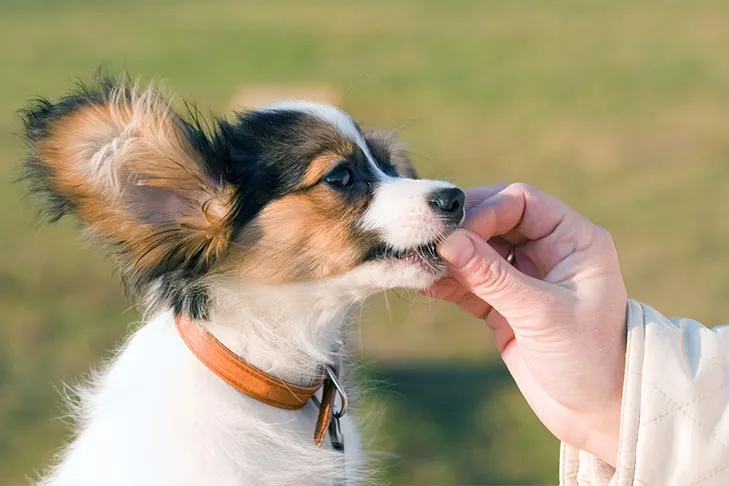Golden Retrievers are renowned for their friendly demeanor, intelligence, and boundless energy. As devoted companions, ensuring their health and happiness is a top priority for any owner, and their diet plays a pivotal role in achieving this. While commercial dog food provides a balanced nutritional foundation, many Golden Retriever parents wonder about sharing human foods. It’s a natural inclination to want to treat your furry family member, but knowing which human foods are safe and which are dangerous is critical. This guide, tailored specifically for Golden Retriever owners, will delve into the nuances of canine nutrition, highlighting what your beloved Golden can safely enjoy and what should be strictly avoided, helping you make informed decisions for their well-being.
Understanding Your Golden Retriever’s Dietary Needs
Golden Retrievers are a large, active breed, and their dietary requirements differ from smaller, less active dogs. They are predisposed to certain health conditions that can be influenced by diet, making informed food choices even more important:
- Obesity: Goldens have a hearty appetite and can easily become overweight if their food intake isn’t carefully managed. Excess weight puts additional strain on their joints and can lead to other serious health issues like diabetes and heart disease.
- Joint Issues: Golden Retrievers are prone to hip and elbow dysplasia. A healthy diet that supports joint health (e.g., adequate protein, omega-3 fatty acids, weight management) is crucial in preventing or managing these conditions.
- Allergies and Sensitivities: Some Golden Retrievers can develop food allergies or sensitivities, manifesting as skin issues, digestive upset, or ear infections. Monitoring their diet and introducing new foods slowly can help identify and avoid triggers.
- Cardiac Health: Certain dietary choices can impact heart health, particularly in breeds prone to dilated cardiomyopathy (DCM). Ensuring a balanced diet with appropriate nutrient levels is key.
- Dental Health: The right diet can contribute to good dental hygiene, reducing plaque and tartar buildup.
Considering these factors, selecting the right human foods as occasional treats or dietary supplements for your Golden Retriever requires careful consideration. For a broader perspective on general canine nutrition, you can also explore what foods can you give your dog.
Safe Human Foods for Golden Retrievers: A Detailed List
Here’s a list of common human foods that are generally safe for Golden Retrievers in moderation, along with important preparation notes and breed-specific considerations.
Bread
Small quantities of plain, unseasoned bread are typically safe for Golden Retrievers, provided it doesn’t contain harmful ingredients like raisins or artificial sweeteners. However, bread offers minimal nutritional value and is high in carbohydrates and calories. For Goldens prone to weight gain, it’s best offered sparingly, if at all, as an occasional, small treat. Homemade bread without preservatives is slightly better than store-bought, but the caloric density remains a concern for maintaining your Golden’s ideal weight.
Cashews
Cashews can be a suitable treat for your Golden Retriever in very small amounts. They contain beneficial nutrients like calcium, magnesium, antioxidants, and protein. However, cashews are also high in fat. While generally safer than some other nuts, feeding too many can contribute to weight gain and potentially lead to pancreatitis, especially in larger breeds like Goldens. Always offer unsalted cashews and limit them to just a few at a time.
Cheese
Many Golden Retrievers love cheese, and it can be a good high-value treat. Most dogs are not lactose intolerant, but it’s always wise to introduce cheese in small amounts to observe your Golden’s reaction. Opt for lower-fat varieties such as cottage cheese or mozzarella to avoid excessive fat intake, which is important for Goldens who are susceptible to weight issues. Cheese should only be given as an occasional treat and not as a regular part of their diet. Many dogs also enjoy their very own dog-specific Himalayan dog chew made of dried cheese.
 A Golden Retriever mix, possibly an All American Dog, resting its head on a kitchen counter, attentively looking at a piece of cheese.
A Golden Retriever mix, possibly an All American Dog, resting its head on a kitchen counter, attentively looking at a piece of cheese.
Coconut
Coconut, including its meat, milk, and oil, can offer several benefits for Golden Retrievers. It contains lauric acid, known for its anti-bacterial and anti-viral properties. Coconut can also help improve bad breath and alleviate certain skin conditions like hot spots, flea allergies, and general itchy skin, which some Goldens are prone to. When offering fresh coconut, ensure the fibrous outer shell is completely removed to prevent choking hazards or intestinal blockages. Both coconut milk and coconut oil are safe in moderation.
Corn
Corn is a common ingredient in many high-quality dog foods and is perfectly safe for Golden Retrievers. It provides carbohydrates for energy, along with some fiber and antioxidants. The key is to serve it off the cob. The cob itself is indigestible and can cause a serious intestinal blockage, which would require veterinary intervention. If sharing, ensure it’s plain and unseasoned.
Eggs
Cooked eggs are an excellent source of protein and essential amino acids for Golden Retrievers, contributing to their muscle development and overall health. They can also be gentle on an upset stomach. It is crucial that eggs are fully cooked (scrambled, boiled, or poached) to eliminate any risk of salmonella and to prevent biotin deficiency, which can be caused by a substance in raw egg whites. Never feed raw eggs to your Golden.
Fish
Certain types of fully cooked fish can be highly beneficial for Golden Retrievers, providing healthy fats and amino acids. Salmon and sardines are particularly excellent choices. Salmon is rich in Omega-3 fatty acids, which are vital for supporting joint health (crucial for Goldens), promoting a healthy skin and coat, and boosting their immune system. Sardines offer similar benefits and have soft, digestible bones that provide extra calcium. Always ensure fish is thoroughly cooked and all small bones, except for those in sardines, are carefully removed to prevent choking or internal injury. Limit fish intake to once or twice a week.
Ham
While a very small, unseasoned piece of cooked ham won’t immediately harm your Golden Retriever, it’s far from being a healthy treat. Ham is typically high in sodium and fat, which are not ideal for Goldens, especially those needing to manage their weight or prone to pancreatitis. It should be considered an absolute occasional indulgence rather than a regular treat.
 A French Bulldog eating heartily from a metal food bowl placed on a wooden floor in a home setting.
A French Bulldog eating heartily from a metal food bowl placed on a wooden floor in a home setting.
Honey
Honey is packed with numerous nutrients, including vitamins (like A), minerals (potassium, calcium, magnesium, copper), and antioxidants. For Golden Retrievers that suffer from seasonal allergies, small amounts of local honey might help build immunity to environmental allergens. Additionally, honey has antiseptic properties and can be used topically on minor cuts or burns (after veterinary consultation). Due to its high sugar content, give honey in strict moderation.
Milk
Some Golden Retrievers can digest milk in small quantities, but many adult dogs are lactose intolerant, meaning they lack the enzyme to properly break down milk sugar. Symptoms of lactose intolerance can include digestive upset like diarrhea or vomiting. While a tiny splash of milk is generally okay, it’s often safer to stick to water or lactose-free alternatives. Observe your Golden for any signs of intolerance.
Peanut Butter
Peanut butter is a popular and often effective treat for Golden Retrievers, providing a good source of protein, heart-healthy fats, and vitamins B and E. However, it is critically important to choose raw, unsalted peanut butter and to always check the label for xylitol. Xylitol is a sugar substitute highly toxic to dogs, even in small amounts, and can cause a rapid drop in blood sugar, seizures, liver failure, or even death. Ensure the peanut butter is xylitol-free.
Peanuts
Unlike macadamia nuts, plain, unsalted peanuts are safe for Golden Retrievers in moderation. They offer beneficial fats and protein. However, like cashews, their high-fat content means they should only be given as an occasional treat to avoid excessive calorie intake and potential pancreatitis. Always ensure they are unsalted and shelled.
Popcorn
Plain, air-popped, unsalted, and unbuttered popcorn can be a safe and fun treat for your Golden Retriever in moderation. It contains riboflavin and thiamine, which support eye health and digestion, along with small amounts of iron and protein. Ensure all kernels are fully popped, as unpopped kernels can pose a choking hazard or become lodged in their teeth.
Pork
Cooked pork without bones or seasonings can be a highly digestible protein source for Golden Retrievers, rich in amino acids. It might also be a good option for Goldens with sensitivities to other common proteins like chicken or beef. However, pork generally contains more calories and fat per pound than other lean meats, so it should be offered sparingly and trimmed of excess fat to avoid contributing to weight gain.
Quinoa
Quinoa is a highly nutritious whole grain that you’ll find in some premium dog foods. It’s an excellent source of protein, fiber, and essential minerals, offering a healthy alternative to common starches like corn, wheat, and soy. For Golden Retrievers, especially those with grain sensitivities or those needing diverse nutrient sources, cooked and plain quinoa can be a beneficial addition to their diet in small amounts.
 A fluffy white Samoyed puppy relaxing on lush green grass outdoors, looking content and peaceful.
A fluffy white Samoyed puppy relaxing on lush green grass outdoors, looking content and peaceful.
Shrimp
Cooked shrimp, with the shell, tail, head, and legs completely removed, can be a healthy treat for your Golden Retriever. Shrimp are low in fat, calories, and carbohydrates, while being rich in antioxidants, vitamin B-12, and phosphorus. Offer only a few shrimp occasionally, ensuring they are thoroughly cooked and unseasoned to prevent digestive upset.
Tuna
Cooked, fresh tuna in moderation can be an excellent source of Omega-3 fatty acids, which promote heart and eye health for your Golden Retriever. However, caution is advised with canned tuna. While a small amount of canned tuna (packed in water, not oil, and unseasoned) is generally safe, it can contain small amounts of mercury and sodium. Excessive intake of these can be harmful, so canned tuna should be a very rare treat.
Turkey
Plain, cooked turkey is a lean, highly digestible protein source that is safe for Golden Retrievers. It’s often included in commercial dog foods. When feeding turkey, always remove any excess fat and skin, and meticulously check for bones, as cooked poultry bones can splinter and cause severe internal damage. Ensure the turkey is unseasoned, as onions, garlic, and excessive salt are toxic to dogs.
Wheat or Grains
Contrary to popular belief, grains like wheat, corn, and oats are not inherently bad for Golden Retrievers and can be excellent sources of protein, essential fatty acids, and fiber. Unless your Golden has a diagnosed grain allergy or sensitivity, there’s no need to feed a grain-free diet. In fact, whole grains can contribute positively to their overall health. If you suspect a grain allergy, consult your veterinarian for proper diagnosis and dietary recommendations.
Yogurt
Plain, unsweetened yogurt can be a beneficial snack for Golden Retrievers, especially for its probiotic content. The active bacteria in yogurt can help strengthen their digestive system and promote gut health, which is particularly useful for Goldens with sensitive stomachs. However, like milk, some dogs may have difficulty digesting dairy products. Always choose plain yogurt without any added sugars, artificial sweeteners (especially xylitol), or fruit flavorings.
 A small Papillon puppy delicately taking a treat from a human hand, showcasing gentle manners.
A small Papillon puppy delicately taking a treat from a human hand, showcasing gentle manners.
Human Foods Golden Retrievers Should Never Eat
It’s paramount for every Golden Retriever owner to be aware of human foods that are toxic and potentially fatal to dogs. If you suspect your Golden has ingested any of these, contact your veterinarian immediately. For a more comprehensive list of substances to avoid, refer to our article on what human foods can a dog not have.
- Chocolate: Contains theobromine, which is toxic to dogs. Dark chocolate and baking chocolate are the most dangerous. Symptoms include vomiting, diarrhea, tremors, seizures, and heart problems.
- Grapes and Raisins: Highly toxic, even in small amounts, and can lead to acute kidney failure. The exact toxic substance is unknown.
- Xylitol: A sugar substitute found in many sugar-free products (gum, candies, peanut butter, toothpaste, baked goods). It causes a rapid and severe drop in blood sugar (hypoglycemia) and can lead to liver failure. Extremely dangerous.
- Onions, Garlic, Chives, and Leeks: All members of the Allium family, these contain compounds that can damage a dog’s red blood cells, leading to anemia. Symptoms can appear days after ingestion.
- Avocado: Contains Persin, a fungicidal toxin. While the amount in the fruit itself might be low, it can cause vomiting and diarrhea. The pit is also a choking hazard and can cause intestinal blockage.
- Alcohol: Extremely toxic. Even small amounts can cause significant intoxication, respiratory depression, coma, and death. Never offer alcohol to your Golden Retriever.
- Caffeine: Found in coffee, tea, soda, energy drinks, and some medications. It acts as a stimulant and can cause restlessness, increased heart rate, tremors, and seizures.
- Macadamia Nuts: Can cause weakness, depression, vomiting, tremors, and hyperthermia. The exact toxic compound is unknown.
- Cooked Bones: While raw bones can be beneficial (with proper guidance), cooked bones are brittle and can splinter, causing choking, cuts in the mouth or digestive tract, or intestinal blockages.
- Raw Yeast Dough: The yeast can ferment in the stomach, producing alcohol (which is toxic) and gases that can cause painful bloating and potentially life-threatening gastric dilatation-volvulus (bloat).
- Molding or Spoiled Foods: Contain toxins (mycotoxins) that can cause severe neurological problems and digestive upset.
- Excessive Fat/Greasy Foods: While not strictly “toxic,” large amounts of fatty foods can lead to pancreatitis, a painful and potentially life-threatening inflammation of the pancreas. This is particularly relevant for Golden Retrievers due to their propensity for weight gain.
Feeding Tips and Best Practices for Golden Retriever Owners
Even with safe foods, how you offer them matters for your Golden Retriever’s health and safety:
- Moderation is Key: Treats should never make up more than 10% of your Golden’s daily caloric intake. This helps prevent obesity and ensures they still get essential nutrients from their balanced dog food.
- Introduce New Foods Slowly: When trying a new human food, offer a very small amount first and monitor your Golden Retriever for any signs of digestive upset (vomiting, diarrhea, gas) or allergic reactions.
- Always Prepare Plain: Never give your Golden Retriever human food that has been cooked with salt, pepper, onions, garlic, other seasonings, or excessive fats.
- Remove Bones and Pits: Always ensure all bones, pits, seeds, and hard outer shells are removed from fruits and vegetables to prevent choking hazards or intestinal blockages.
- Portion Control: Slice or dice foods into small, manageable pieces appropriate for your Golden’s size to reduce choking risks.
- Consult Your Veterinarian: Before making significant changes to your Golden Retriever’s diet or if you have any concerns about specific human foods, always consult your veterinarian. They can offer personalized advice based on your dog’s individual health, age, and any existing conditions.
- Observe Your Dog: Pay close attention to how your Golden reacts to any new food. Every dog is unique, and what’s safe for one might not agree with another.
Conclusion
Feeding your Golden Retriever human foods can be a delightful way to bond and provide extra nutritional variety, but it requires knowledge and caution. By understanding their specific dietary needs and being vigilant about what they can and cannot eat, you can ensure their continued health and vitality. Always prioritize safe, plain, and appropriately portioned foods, and never hesitate to seek professional veterinary advice. Your Golden Retriever relies on you to make the best dietary choices, contributing to a long, happy, and healthy life together. For more detailed insights into canine nutrition and Golden Retriever care, explore other articles on Dog Care Story.
References
- American Kennel Club. (n.d.). Can Dogs Eat Bread? Retrieved from https://www.akc.org/expert-advice/nutrition/can-dogs-eat-bread/
- American Kennel Club. (n.d.). Can Dogs Eat Cashews? Retrieved from https://www.akc.org/expert-advice/nutrition/can-dogs-eat-cashews/
- American Kennel Club. (n.d.). Can Dogs Eat Cheese? Retrieved from https://www.akc.org/expert-advice/nutrition/can-dogs-eat-cheese/
- American Kennel Club. (n.d.). Can Dogs Eat Coconut? Retrieved from https://www.akc.org/expert-advice/nutrition/can-dogs-eat-coconut/
- American Kennel Club. (n.d.). Can Dogs Eat Corn? Retrieved from https://www.akc.org/expert-advice/nutrition/can-dogs-eat-corn/
- American Kennel Club. (n.d.). Can Dogs Eat Eggs? Retrieved from https://www.akc.org/expert-advice/nutrition/can-dogs-eat-eggs/
- American Kennel Club. (n.d.). Can Dogs Eat Fish? Retrieved from https://www.akc.org/expert-advice/nutrition/can-dogs-eat-fish/
- American Kennel Club. (n.d.). Can Dogs Eat Ham? Retrieved from https://www.akc.org/expert-advice/nutrition/can-dogs-eat-ham/
- American Kennel Club. (n.d.). Can Dogs Eat Honey? Retrieved from https://www.akc.org/expert-advice/nutrition/can-dogs-eat-honey/
- American Kennel Club. (n.d.). Can Dogs Drink Milk? Retrieved from https://www.akc.org/expert-advice/nutrition/can-dogs-drink-milk/
- American Kennel Club. (n.d.). Can Dogs Eat Peanut Butter? Retrieved from https://www.akc.org/expert-advice/nutrition/can-dogs-eat-peanut-butter/
- American Kennel Club. (n.d.). Can Dogs Eat Peanuts? Retrieved from https://www.akc.org/expert-advice/nutrition/can-dogs-eat-peanuts/
- American Kennel Club. (n.d.). Can Dogs Eat Popcorn? Retrieved from https://www.akc.org/expert-advice/nutrition/can-dogs-eat-popcorn/
- American Kennel Club. (n.d.). Can Dogs Eat Pork? Retrieved from https://www.akc.org/expert-advice/nutrition/can-dogs-eat-pork/
- American Kennel Club. (n.d.). Can Dogs Eat Quinoa? Retrieved from https://www.akc.org/expert-advice/nutrition/can-dogs-eat-quinoa/
- American Kennel Club. (n.d.). Can Dogs Eat Salmon? Retrieved from https://www.akc.org/expert-advice/nutrition/can-dogs-eat-salmon/
- American Kennel Club. (n.d.). Can Dogs Eat Shrimp? Retrieved from https://www.akc.org/expert-advice/nutrition/can-dogs-eat-shrimp/
- American Kennel Club. (n.d.). Can Dogs Eat Tuna? Retrieved from https://www.akc.org/expert-advice/nutrition/can-dogs-eat-tuna/
- American Kennel Club. (n.d.). Can Dogs Eat Turkey? Retrieved from https://www.akc.org/expert-advice/nutrition/can-dogs-eat-turkey/
- American Kennel Club. (n.d.). Can Dogs Eat Wheat? Retrieved from https://www.akc.org/expert-advice/nutrition/can-dogs-eat-wheat/
- American Kennel Club. (n.d.). Can Dogs Eat Yogurt? Retrieved from https://www.akc.org/expert-advice/nutrition/can-dogs-eat-yogurt/
